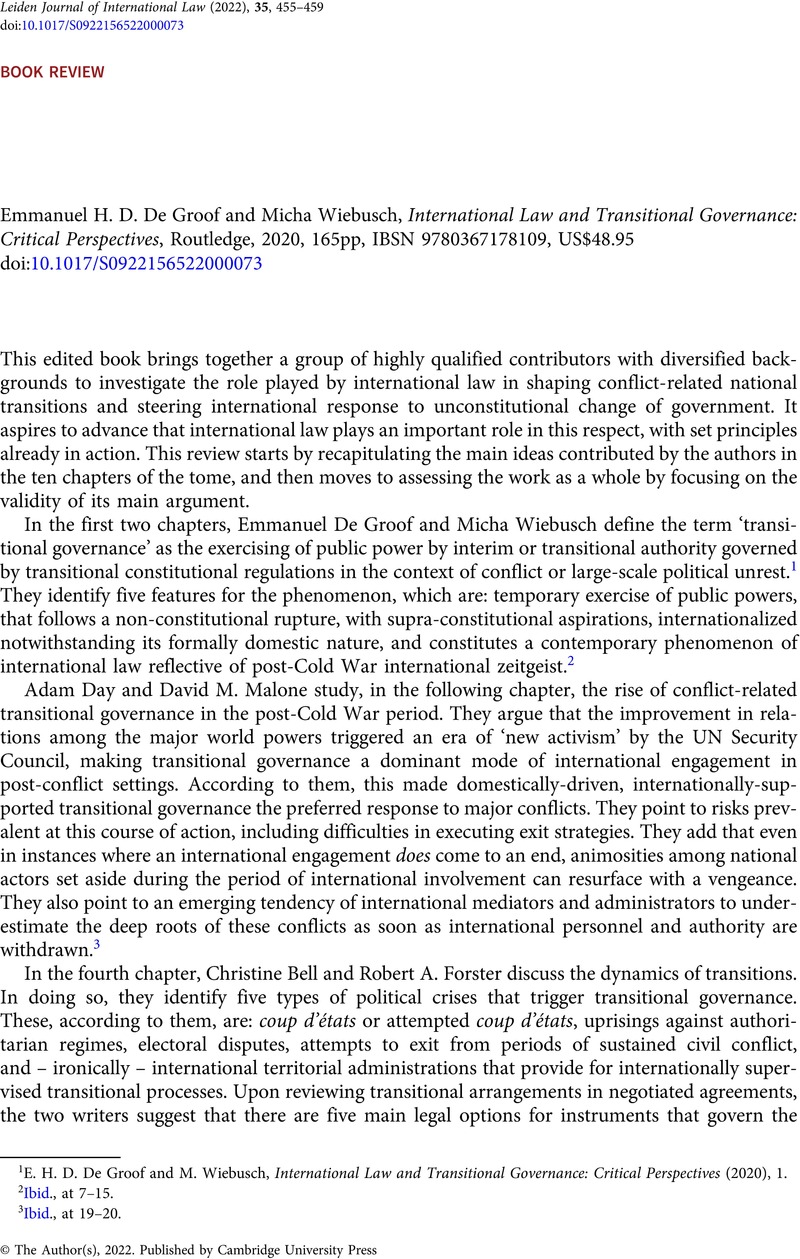No CrossRef data available.
Article contents
Emmanuel H. D. De Groof and Micha Wiebusch , International Law and Transitional Governance: Critical Perspectives, Routledge, 2020, 165pp, IBSN 9780367178109, US$48.95
Review products
Published online by Cambridge University Press: 07 February 2022
Abstract

- Type
- Book Review
- Information
- Copyright
- © The Author(s), 2022. Published by Cambridge University Press
Footnotes
Formerly, he was the permanent delegate of Sudan to the IGAD peace talks on South Sudan 1999-2005. During Sudan’s six-year transition that led to the secession referendum of South Sudan he was rapporteur of the Interim National Constitutional Review Commission, member of the Six-Man Committee that supervised the transition, alternate chairperson of the Ceasefire Political Commission, and Sudan agent for Abyei boundary delimitation at the PCA, The Hague. During his tenure as Foreign Minister of Sudan 2018–2019 he was the IGAD chief mediator for revitalizing the South Sudan peace agreement that brought to an end the South Sudan post-independence civil war. He also played a leading role in the successful AU mediation in the CAR conflict in 2019. Ahmed’s writings include Boundaries and Secession in Africa and International Law published by Cambridge University Press (2015), and a forthcoming article in the 24th volume of the African Yearbook of International Law, under the title: ‘Between Intangibility and Uti Possidetis: The Debate on Title to Territory in Africa’.
References
1 E. H. D. De Groof and M. Wiebusch, International Law and Transitional Governance: Critical Perspectives (2020), 1.
2 Ibid., at 7–15.
3 Ibid., at 19–20.
4 Ibid., at 36–41.
5 Ibid., at 62–70.
6 Ibid., at 67–85.
7 Ibid., at 98–108.
8 Ibid., at 116–29.
9 Ibid., at 141–6.
10 Ibid., at 154–9.
11 Ibid., at 2.
12 Ibid., at 20.
13 A. Cassese, Self-Determination of Peoples: A Legal Appraisal (1981), at 131.
14 See L. Wolf-Phillips, ‘Constitutional Legitimacy: A Study of the Doctrine of Necessity’, (1979) 1(4) Third World Quarterly, at 97–133.
15 See A. Cooley and J. Heathershaw, Dictators without borders: power and money in Central Asia (2016), which argues that the ‘globalized transition’ for Central African states has generally failed to produce polities that conform to the liberal-ideal type of marketized democracies; E. Knowles and K. MacLachlan, ‘Money and War in Afghanistan, Corruption as the Hidden Enemy of Mission Success’, (2015) 2 Fletcher Sec. Rev. 67; C. Cheng and D. Zaum ‘Selling the peace? Corruption and post-conflict peace-building’, in Corruption and post-conflict peace-building: Selling the peace? (2013), 1–25; M. Kodi, ‘Corruption and governance in the DRC during the transition period (2003–2006)’, Institute for Security Studies Monographs, Vol. 2008, No. 148; P. Williams, ‘Organized Crime and Corruption in Iraq’, (2009) 16(1) International Peacekeeping. This last article examines the evolution of organized crime in Iraq from a largely state-controlled phenomenon under Saddam Hussein to a free market criminality under the internationally supported transition.
16 E. de Wet, ‘The African Union’s Struggle against Unconstitutional Change of Government: From a Moral Prescription to a Requirement under International Law?’, (2021) 32(1) EJIL 199–226.


